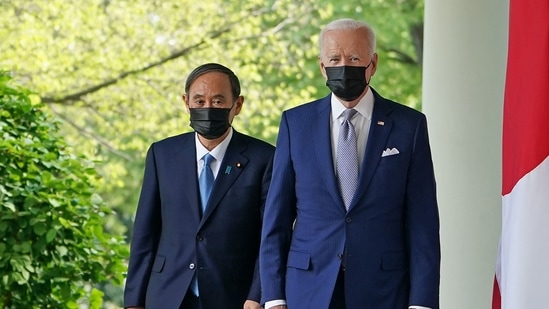Joe Biden-Yoshihide Suga maiden meet focuses on reducing China's growing clout
'What to do about China' remained a primary concern for Biden and Suga as the former held his first in-person meeting at the White House with a foreign leader since taking office.
President Joe Biden welcomed Japan’s Prime Minister Yoshihide Suga to the White House Friday for conversations centered on a growing concern for both leaders: what to do about China.

Suga said he and Biden agreed to pursue collaboration on climate change, Covid-19 and the global shortage of semiconductors. But China’s increasingly assertive role in the region loomed large in the talks, Biden’s first in-person meeting at the White House with a foreign leader since taking office.
“We committed to working together to take on the challenges from China, and on issues like the East China Sea, the South China Sea as well as North Korea to ensure a future of a free and open Indo-Pacific,” Biden said at joint news conference in the White House Rose Garden. Suga said the leaders pledged “peace and stability” in the Taiwan Strait.
But the two didn’t announce any major new agreements on China, and Japan must strike a balance between deterring China while keeping Beijing, its largest trading partner, from lashing out. Asked by a reporter, Suga said he wouldn’t provide details of his “diplomatic exchanges” with Biden over the Taiwan Strait.
On other topics, Suga said he won Biden’s backing for hosting the Tokyo Olympics, which are set to begin in July, despite the continuing coronavirus pandemic. And Biden said the two leaders agreed to collaborate on technology, including the supply shortage on semiconductors that has idled some U.S. auto manufacturing and created shortages of some consumer products.
“We’re going to work together across a range of fields,” Biden said. “From promoting secure and reliable 5G networks to increasing our cooperation on supply chains for critical sectors like semiconductors, to driving joint research in areas like AI, genomics, quantum computing and much more.”
Asked about Iran, Biden criticized the Islamic Republic’s decision to further enrich uranium but signaled that the move won’t prevent indirect talks in Vienna aimed at restoring a 2015 nuclear accord from proceeding.
Suga had breakfast on Friday with former US Ambassador to Japan Caroline Kennedy and then took part in a wreath-laying ceremony at Arlington National Cemetery. He also met with Vice President Kamala Harris.
Shift to Asia
The timing of the meeting -- just days after Biden announced a withdrawal from Afghanistan -- provides the most visible sign yet that the American president is determined to shift the center of gravity of US foreign policy to the Indo-Pacific. And for Japan, being first into the White House gives Suga a prime chance to set the tone for ties with Washington over a slew of issues for years to come.
Friday’s meeting builds on Secretary of State Antony Blinken’s first visits abroad last month to Japan and South Korea, and it comes amid China’s continuing aggressiveness over Hong Kong, Taiwan and the South China Sea.
Ahead of the Biden-Suga talks, China’s foreign ministry spokesman expressed “serious concerns” about negative moves and collusion between the US and Japan, the Associated Press reported. Spokesman Zhao Lijian said the two nations should “avoid words and actions that interfere in China’s internal affairs and harm China’s interests,” according to the AP.
China escalated its military intimidation of the government in Taipei by sending 25 fighters, bombers and other planes into the southwest section of Taiwan’s air defense identification zone early this week. Chinese military activity has steadily picked up around democratically ruled Taiwan in recent months.
Suga said he and Biden “agreed to oppose any attempts to change the status quo by force or coercion in the East or South China Seas and intimidation of others in the region.”
He added: “At the same time, we agreed on the necessity for each of us to engage in frank dialogue with China, and in so doing to pursue stability of international relations while upholding universal values.”
Last month, Blinken, his Japanese counterpart Toshimitsu Motegi and both nations’ defense ministers made unusually explicit references to China’s “coercion and destabilizing behavior” and to concerns over human rights.
Yet despite Japan’s willingness to criticize China and step up its commitments on climate change, the US and Japanese approaches aren’t entirely in lockstep.
While Japan is investing heavily in green energy and has set a zero-emissions target for 2050, it has been criticized for not moving aggressively enough to reduce emissions by 2030. Biden and Suga said they agreed to cooperate on climate change and green energy.
And while Japan is worried about China’s military buildup, it is arguably just as concerned about undercutting economic ties. China is Japan’s biggest export market, with more than 13,000 Japanese companies are operating in China, according to a survey published last year.
Suga has come under pressure, including from lawmakers in his own party, for Japan to join other major democracies in imposing sanctions on China over human rights abuses. But Japan lacks a legal framework to take such a step, and some members of its business community are opposed.
Suga treated lightly on questions about human rights abuses in China. “As we engaged in an exchange of views over the recent situation we also discussed the circumstances in Taiwan and Xinjiang Uyghur Autonomous Region as well,” Suga said.
A senior Japanese official said that while Tokyo is becoming increasingly vocal against China on human rights, it doesn’t think that sanctions and trade restrictions are a productive way to deal with Beijing. The official added that Japan and the US plan to work closely on supply-chain resilience, focusing on key areas such as raw materials and semiconductors.



